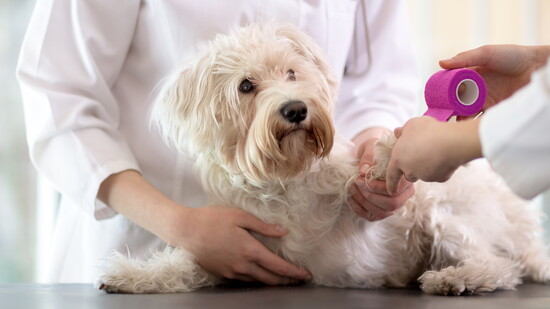When Dr. Elizabeth Jobe decided to pull over on a South Carolina highway nearly two decades ago, she didn’t realize she was about to change the course of her life. She thought she had spotted a raccoon in a drain whilst driving by, but upon peering into that storm drain, she found a wide-eyed black-and-white puppy. She named her Bailey, and the two would go on to share 19 inseparable years together.
Bailey would become much more than a pet. She was a study partner through veterinary school, a companion on hiking trails across the country, and eventually, the inspiration for Dr. Jobe’s own practice: The Bailey Veterinary Medical Center in Oro Valley, Arizona. Bailey, Dr. Jobe says, was a model of lifelong wellness—the kind of thriving life she now strives to help all her patients achieve.
Behind every cheerful exam room greeting and tail-wagging patient, though, is a profession that demands both emotional endurance and unrelenting pace. On an average day, Dr. Jobe sees up to 20 patients, bouncing between routine checkups, acupuncture sessions, physical rehabilitation, and complex diagnostics. "People don’t always see the volume we manage," she explains. "When I haven’t called someone back in a few hours, it’s probably because I’m in back-to-back appointments while reviewing 10 to 20 lab panels from the day before."
That sheer pace is only one part of the challenge. There’s also the emotional whiplash. One moment she’s treating a snakebite emergency, the next she’s celebrating a puppy’s first visit. Moments later, she may be performing a euthanasia for a long-time patient. “It’s a rollercoaster,” she says, “but I do my best to make sure each client feels like they’re the only one in the building.”
It’s that empathy—quiet, enduring, and deeply human—that defines Dr. Jobe’s work. When asked what she wishes pet owners better understood about their vets, her list is heartfelt and practical.
First, she says, understand that your pet may actually do better away from you during treatments. At her Fear Free certified clinic, she and her staff are trained to reduce stress and anxiety in pets. “Sometimes, owners unintentionally make their pets more nervous just by being in the room,” she notes. “Taking them out of the room and into the treatment area isn’t about secrecy. It’s about giving your pet the best chance to relax and cooperate.”
Secondly, the cost of veterinary care involves much more than meets the eye. Behind each invoice are rising expenses for medications, equipment, and fair wages for skilled staff. “Just like groceries or gas, inflation is affecting our industry too,” Dr. Jobe explains. “It costs me more to buy anesthetic drugs than ever before. We need to move past the mindset of what care used to cost 10 or 15 years ago—medicine has massively evolved, and the costs have adjusted as well.”
She’s also passionate about the importance of preventative care—not just when pets are sick, but when they appear healthy. For pets between the ages of one and six, she recommends yearly wellness visits that include physical exams and lab work. For senior pets, those seven and older, she strongly advises biannual visits. "One in five young pets has abnormalities on their lab work. For older pets, it’s one out of three. These are pets that appear perfectly healthy on the outside. We can catch so much earlier this way, often before symptoms appear. That kind of early detection can dramatically improve outcomes."
But wellness goes beyond routine checkups. Dr. Jobe emphasizes the importance of everyday health habits that make a big difference over a pet’s lifetime. Keeping pets at an ideal weight is one of the simplest and most powerful ways to extend and improve their quality of life. Obesity can exacerbate arthritis, reduce mobility, and increase the risk of chronic conditions like diabetes. “And it’s completely in our control as pet owners,” she notes. Nutrition, too, plays a critical role. Choosing high-quality, research-backed food can promote better long-term health, and Dr. Jobe recommends avoiding trendy grain-free diets unless specifically prescribed, citing links to heart disease in dogs. She also urges pet owners not to neglect dental health. “Dental conditions are the most common conditions I treat surgically,” she says. “Poor dental health doesn’t just affect the mouth—it can send bacteria through the bloodstream and impact the entire body.”
Despite the pressures of her profession, the joys outweigh the challenges. "There’s nothing better than hearing a client say, 'You gave me my dog back,'" she says, smiling. “When you get that diagnosis right, when you help a pet feel like themselves again, that’s everything.”
That joy extends to her clinic’s rehabilitation services, where she’s helped paralyzed dogs walk again through underwater treadmill therapy, acupuncture, and physical exercises. "We've had dogs that couldn't stand on their own start walking again in a matter of weeks," she says. "Those cases are amazing. Seeing a dog regain its mobility and return to a happy, active life is just so rewarding."
After 14 years in the field, Dr. Jobe continues to lead with compassion and quiet determination, carrying Bailey’s legacy in every patient she treats.
What is Fear Free Care?
Fear Free Care is an approach that prioritizes your pet’s emotional well-being during veterinary visits. Certified teams use gentle handling, positive reinforcement, and calming techniques to reduce fear, anxiety, and stress. The result? A more comfortable experience for pets, more accurate exams, and a stronger bond between you, your vet, and your furry family member.
"I do my best to make sure each client feels like they’re the only one in the building.”
“When you get that diagnosis right, when you help a pet feel like themselves again, that’s everything.”
